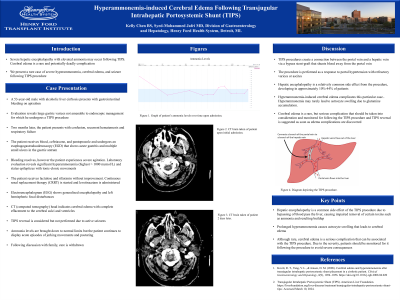Monday Poster Session
Category: Liver
P2996 - Hyperammonemia-Induced Cerebral Edema Following Transjugular Intrahepatic Portosystemic Shunt (TIPS)
Monday, October 28, 2024
10:30 AM - 4:00 PM ET
Location: Exhibit Hall E

Has Audio
- KC
Kelly Y. Chen, BS
Wayne State School of Medicine
Detroit, MI
Presenting Author(s)
Kelly Y. Chen, BS1, Syed-Mohammed Jafri, MD2
1Wayne State School of Medicine, Detroit, MI; 2Henry Ford Health, Detroit, MI
Introduction: Severe hepatic encephalopathy with elevated ammonia may occur following TIPS. Cerebral edema is a rare and potentially deadly complication. We present a rare case of severe hyperammonemia, cerebral edema, and seizure following TIPS procedure.
Case Description/Methods: A 53-year-old male with alcoholic liver cirrhosis presents with gastrointestinal bleeding on apixaban. Evaluation reveals large gastric varices not amenable to endoscopic management for which he undergoes a TIPS procedure. Two months later, the patient presents with confusion, recurrent hematemesis and respiratory failure. The patient receives blood, ceftriaxone, and pantoprazole and undergoes an esophagogastroduodenoscopy (EGD) that shows acute gastritis and multiple small ulcers in the gastric antrum. Bleeding resolves, however the patient experiences severe agitation. Laboratory evaluation reveals significant hyperammonemia (highest > 1000 mcmol/L) and status epilepticus with tonic-clonic movements. The patient receives lactulose and rifaximin without improvement. Continuous renal replacement therapy (CRRT) is started and levetiracetam is administered. Electroencephalogram (EEG) shows generalized encephalopathy and left hemispheric focal disturbances. CT (computed tomography) head indicates cerebral edema with complete effacement to the cerebral sulci and ventricles. TIPS reversal is considered but not performed due to active seizures. Ammonia levels are brought down to normal limits but the patient continues to display acute episodes of jerking movements and posturing. Following discussion with family, care is withdrawn.
Discussion: TIPS procedures create a connection between the portal vein and a hepatic vein via a bypass stent-graft that shunts blood away from the portal vein. The procedure is performed as a response to portal hypertension with refractory varices or ascites. Hepatic encephalopathy is a relatively common side effect from the procedure, developing in approximately 10%-44% of patients. Hyperammonemia-induced cerebral edema complicates this particular case. Hyperammonemia may rarely lead to astrocyte swelling due to glutamine accumulation. Cerebral edema is a rare, but serious complication that should be taken into consideration and monitored for following the TIPS procedure and TIPS reversal is suggested as soon as edema complications are discovered.
Disclosures:
Kelly Y. Chen, BS1, Syed-Mohammed Jafri, MD2. P2996 - Hyperammonemia-Induced Cerebral Edema Following Transjugular Intrahepatic Portosystemic Shunt (TIPS), ACG 2024 Annual Scientific Meeting Abstracts. Philadelphia, PA: American College of Gastroenterology.
1Wayne State School of Medicine, Detroit, MI; 2Henry Ford Health, Detroit, MI
Introduction: Severe hepatic encephalopathy with elevated ammonia may occur following TIPS. Cerebral edema is a rare and potentially deadly complication. We present a rare case of severe hyperammonemia, cerebral edema, and seizure following TIPS procedure.
Case Description/Methods: A 53-year-old male with alcoholic liver cirrhosis presents with gastrointestinal bleeding on apixaban. Evaluation reveals large gastric varices not amenable to endoscopic management for which he undergoes a TIPS procedure. Two months later, the patient presents with confusion, recurrent hematemesis and respiratory failure. The patient receives blood, ceftriaxone, and pantoprazole and undergoes an esophagogastroduodenoscopy (EGD) that shows acute gastritis and multiple small ulcers in the gastric antrum. Bleeding resolves, however the patient experiences severe agitation. Laboratory evaluation reveals significant hyperammonemia (highest > 1000 mcmol/L) and status epilepticus with tonic-clonic movements. The patient receives lactulose and rifaximin without improvement. Continuous renal replacement therapy (CRRT) is started and levetiracetam is administered. Electroencephalogram (EEG) shows generalized encephalopathy and left hemispheric focal disturbances. CT (computed tomography) head indicates cerebral edema with complete effacement to the cerebral sulci and ventricles. TIPS reversal is considered but not performed due to active seizures. Ammonia levels are brought down to normal limits but the patient continues to display acute episodes of jerking movements and posturing. Following discussion with family, care is withdrawn.
Discussion: TIPS procedures create a connection between the portal vein and a hepatic vein via a bypass stent-graft that shunts blood away from the portal vein. The procedure is performed as a response to portal hypertension with refractory varices or ascites. Hepatic encephalopathy is a relatively common side effect from the procedure, developing in approximately 10%-44% of patients. Hyperammonemia-induced cerebral edema complicates this particular case. Hyperammonemia may rarely lead to astrocyte swelling due to glutamine accumulation. Cerebral edema is a rare, but serious complication that should be taken into consideration and monitored for following the TIPS procedure and TIPS reversal is suggested as soon as edema complications are discovered.
Disclosures:
Kelly Chen indicated no relevant financial relationships.
Syed-Mohammed Jafri: Gilead, Takeda, Abbvie, Intercept, VectivBio – Advisor or Review Panel Member, Speakers Bureau.
Kelly Y. Chen, BS1, Syed-Mohammed Jafri, MD2. P2996 - Hyperammonemia-Induced Cerebral Edema Following Transjugular Intrahepatic Portosystemic Shunt (TIPS), ACG 2024 Annual Scientific Meeting Abstracts. Philadelphia, PA: American College of Gastroenterology.
